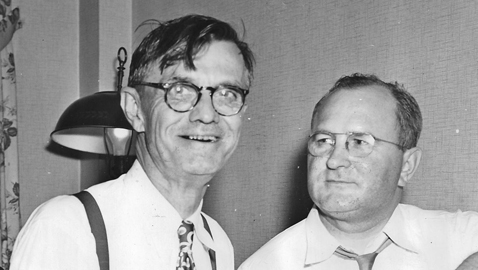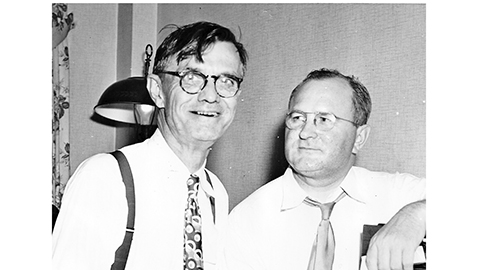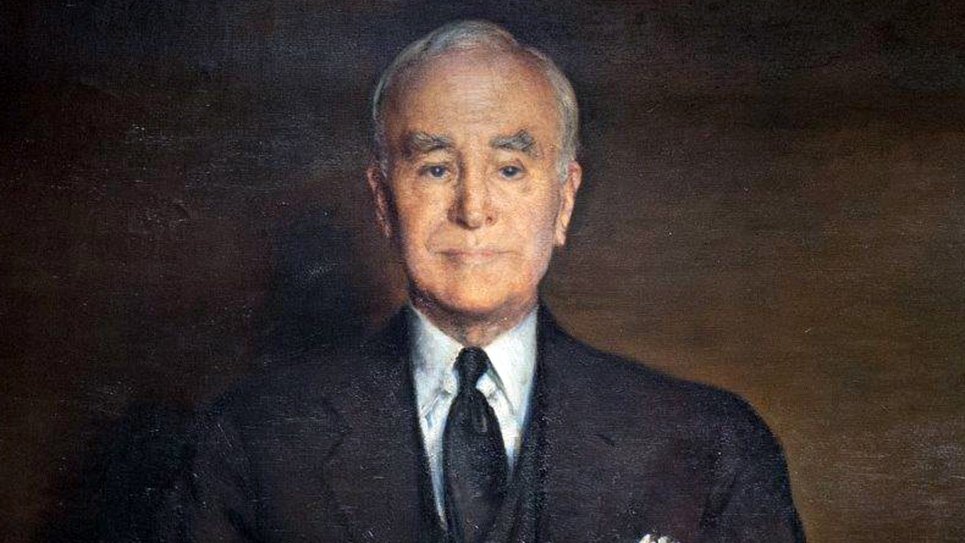
From the author’s personal collection.
Governor-elect Eugene Talmadge (left) and his campaign manager, Roy Harris in 1946.
For two decades, Eugene “Gene” Talmadge, was a fixture in Georgia politics. Bold, brash and plain spoken, Gene Talmadge was almost always on the ballot for some office until his death.
Born on September 23, 1884 in Forsyth, Georgia, Gene Talmadge was far better educated than one might have otherwise believed. Talmadge attended the University of Georgia and earned a law degree from the same institution.
Initially, Gene Talmadge’s foray into politics was unsuccessful. He ran for the state legislature twice and was twice defeated. Talmadge’s first political success was his election as Commissioner of Agriculture for Georgia in 1926. Things were never quiet when Gene Talmadge was involved; in fact, it was quite the opposite. Controversy seemed to positively swirl about “Ol’ Gene’s” head like flies in a humid Georgia summer.
Talmadge ran the Agriculture Commissioner’s office just as he pleased and his political opponents accused him of malfeasance in office and out right theft, yet Talmadge proved to be enormously popular with one of Georgia’s prime political constituencies: farmers. Commissioner Talmadge published a newspaper that was quite popular with farmers, offering advice, as well as a heaping helping of Ol’ Gene’s views on a variety of topics.
Gene Talmadge had toppled the incumbent Agriculture Commissioner in 1926, despite the fact the incumbent benefitted from a small patronage army. Talmadge was reelected again in 1928 and 1930.
Talmadge opponents in the legislature did not go so far as to attempt to impeach him, but they did formally recommend he be sued to recover state funds they believed he had misappropriated. Governor Richard Russell cautiously turned over the matter of suing Commissioner Talmadge to the state Attorney General, who concluded to drop the idea of any suit.
Governor Russell opted not to run again in 1932, preferring instead to contest a seat in the United States Senate. Russell’s decision gave Eugene Talmadge his opportunity to run for governor and Ol’ Gene hit the stump in one of his typically wrinkled suits. A wiry man with an unruly forelock of black hair that continually fell across his brow, the bespectacled Talmadge was an electrifying speaker and the farmers would howl with delight when Ol’ Gene doffed his jacket to reveal his bright red suspenders. Talmagde offered his guests free barbecue or fried fish and lambasted his opponents with down home witticisms that were oftentimes devastating to his opponents.
When hecklers accused him of theft as Commissioner of Agriculture, Talmadge dismissed the charge by saying, “Sure I stole, but I stole it for you!”
At the time, Georgia was a one-party state and the Democratic nomination was tantamount to election. Republicans were scarce and rarely white. Candidates competed for votes under Georgia’s county unit plan; each county in the State of Georgia were assigned a number of votes and the candidate who carried the county won the votes, rather like a miniature Electoral College.
Eugene Talmagde was highly popular in Georgia’s numerous rural counties and he easily won the county unit vote in the 1932 election. Talmadge was later to brag that he could “carry any county that ain’t got streetcars.”
Talmagde’s first campaign for governor demonstrated his resourcefulness as a shrewd politician and an excellent campaigner. Talmadge excoriated the fee charged by the state for license plates, promising that if he were elected, he would reduce the fee to three dollars, which would allow poor farmers to afford them. For many of Georgia’s less well-off citizens, it was proof positive Gene Talmadge was on their side.
Governor Talmadge immediately insisted the state legislature lower the fee for license plates and after debating it extensively, did nothing. That didn’t bother Ol’ Gene, he merely reduced the fee himself via gubernatorial proclamation once the legislature was out of session.
Talmadge’s first term as governor was again marked by the same kind of controversy and charges of corruption as had been his tenure as Commissioner of Agriculture. Talmadge was positively loathed by much of the press in Georgia, especially in the state’s more populous cities. Talmadge was equally thoroughly disliked by much of the business establishment and political elite. Ol’ Gene effectively used the opposition of the establishment to burnish his own image as a man of the common people and opponent of the special interests.
Talmadge’s refusal to play by the established rules only seemed to increase his popularity, much to the dismay and fury of his opponents. Although Governor Talmadge cultivated a sort of backwoods image, it apparently was an act. Visitors to his office found a small, quite well dressed man who could easily utilize a more urbane vocabulary, usually while smoking a large cigar.
Governor Talmadge sought a second two-year term in 1934 and demolished his opposition, winning every county in the State of Georgia save for three. Shortly before the general election, Governor Talmadge was irked by a textile workers’ strike. Ol’ Gene was having none of it and had the picketers arrested and placed in a former World War I camp that had once held prisoners of war. A show of force never bothered Talmadge.
When Governor Talmadge felt utility rates were too high in Georgia, he insisted the Public Utilities Commission fix the problem; the utility Commissioners, elected by the people, refused to lower rates and Governor Talmadge responded by arbitrarily creating a wholly new board to get his way. The Highway Commission suffered pretty much the same fate when it resisted the governor’s power. The governor declared martial law and increased the size of the board and made it more responsive to his wishes. Already haven proved he had little regard for those officials elected by the people, Governor Talmadge encountered opposition from the state treasurer and state comptroller and Ol’ Gene had them seized and physically removed from their own offices and the State Capitol.
Naturally, Talmadge’s opponents derided him as a petty dictator, but many of his actions were perceived by his supporters as necessary and cared little how he got things done.
Governor Talmadge found himself at odds with the most popular politician in the country, Franklin Delano Roosevelt. Increasingly alarmed with the liberalism of Roosevelt’s New Deal administration, Talmadge began speaking out against FDR. Talmadge, a virulent racist, claimed many of the president’s policies were designed to be less helpful to white citizens than blacks. Talmadge tried to rally Southerners to oppose Roosevelt, with little success. It was a risky approach in Georgia where FDR maintained his famed “Little White House” and considered himself an adopted citizen of the state. FDR was vastly popular in Georgia and Roosevelt’s personal popularity would help derail Gene Talmadge’s next campaign.
Eugene Talmadge, first dreaming of occupying the White House himself, settled for challenging Georgia’s junior United States senator, Richard Russell, in the 1936 Democratic primary. Senator Russell, who would go on to become an iconic figure in Georgia, was deeply shaken by Talmagde’s bid for his Senate seat and many thought Talmadge would win. Russell had to wage a hard fight and in the end, defeated the governor decisively.
Undeterred, Talmadge again ran for Georgia’s other seat in the United States Senate in 1938, facing incumbent Walter F. George. The stately George had been a successful lawyer, a justice of the State Supreme Court, and was a highly regarded figure in Georgia. Walter George was profoundly respected by virtually all of Georgia’s big businessmen, with much of his financial support coming from the Georgia Light and Power Company and Coca-Cola. The 1938 Senate race was complicated by President Roosevelt who, angry at his plan to enlarge the United States Supreme Court having been beaten in the Senate, sought to purge Senator Walter F. George from that body. FDR personally came to Georgia and made a speech saying George did not deserve reelection and announced were he a Georgian, he would vote for Lawrence Camp, the candidate supported by the New Deal administration. Senator George, sitting on the same platform as President Roosevelt denounced him, got up and calmly said he accepted the challenge.
Ol’ Gene exulted with President Roosevelt’s denunciation of Senator George. Talmadge thought it would be difficult for him to lose a three-way race for the nomination. Roosevelt’s opposition to Senator George distressed and appalled many Georgians who, as much as they loved FDR, disliked outside intervention in selecting their own elected officials. George won the Senate contest rather easily and much of Gene Talmadge’s opposition in Georgia believed he was finished as a political force in the state.
Gene Talmadge hardly shared that assessment of his political fortunes and announced he would once again be a candidate for governor of Georgia in 1940. Talmadge had run well ahead of President Roosevelt’s chosen candidate in the 1938 Senate race and to the surprise of his critics, he won the gubernatorial election.
Almost immediately, Governor Talmadge was embroiled in yet another controversy. Talmadge was after the scalp of a dean at the University of Georgia who had suggested white and black citizens should be brought together to be taught. Talmadge demanded the dean be fired, but the university’s Board of Regents balked. Once again, Talmadge restructured yet another board that did not bend to his will and the governor got his way. This time there were serious repercussions and the university’s accreditation and that of Georgia’s state schools and universities was revoked by the Southern Association of Colleges and Schools.
It was a stinging rebuke to a governor who complained the university had become a breeding ground for liberalism, communism, and worse. Talmadge was seeking reelection in 1942 and Georgia had changed the law to allow a governor to serve one four-year term instead of two two-year terms. Gene Talmadge desperately wanted to win reelection, but lost to reform candidate Ellis Arnall, largely because of Talmadge’s interference with the university.
Forced out of office, Gene Talmadge returned to his law practice and operating his farm, which was quite successful. Talmadge’s wife, Mitt, actually ran the farm so efficiently it made the family rather wealthy.
Talmadge bided his time and as Governor Arnall could not succeed himself, entered the 1946 primary for governor. It was the last of Gene Talmadge’s campaigns and despite not being entirely well, Ol’ Gene gave it everything he had. Stumping all across the state, snapping his red galluses, Talmadge lost the popular vote that year, but won the county unit vote, which was enough to make him the Democratic nominee and presumptive governor-elect.
Gene Talmadge never got to serve as governor again, but did manage to turn Georgia politics on its head yet again. Talmadge, weakened by his love of cigars and hard liquor, died suddenly on December 21, 1946. Talmadge’s death precipitated a wild scramble that left Georgia with three governors.
Gene Talmadge’s death did not come as a complete surprise to some of his top advisers, who had taken the precaution of determining just what would happen if the duly elected governor died before he was able to take the oath of office. They determined that should the governor-elect die before being sworn into office, the legislature would choose from amongst the second and third place contenders in the election. Although Talmadge was unopposed in the general election, supporters had written in the name of Ol’ Gene’s son and campaign manager, Herman.
Herman Talmadge finished second to his father.
Lieutenant Governor Melvin E. Thompson insisted he was the lawful governor, saying he should be sworn in due to Eugene Talmadge’s death. Thompson’s claim to the office was clouded by incumbent governor Ellis Arnall who said he should remain in office until a duly chosen successor was properly elected.
The dispute was a bizarre political and legal brawl, almost comical in nature.
Governor Arnall refused to surrender possession of the governor’s office, although Herman Talmadge managed to occupy it himself and had the locks changed, while Lieutenant Governor M. E. Thompson hurried to file a claim with the State Supreme Court. Although elected by the legislature, Herman Talmadge was removed from office by the Supreme Court in March of 1947. The court held that M. E. Thompson was indeed the acting governor until the 1948 election.
Thompson’s elation was short-lived, as Herman Talmagde ran in 1948 and was elected governor. The Talmadge dynasty lasted for three more decades. Herman Talmadge served as governor and was elected to the United States Senate in 1956, having forced out Senator Walter F. George, a feat his father had not been able to accomplish. Herman Talmadge remained in the Senate until his defeat in 1980 by a Republican.
Eugene Talmadge, once known as the “Wild Man of Sugar Creek” (and there was an entertaining biography of the same name), the source of so much controversy, sleeps in his native Georgia.







